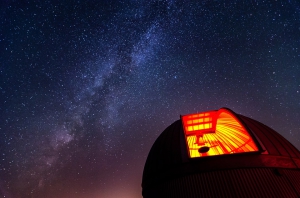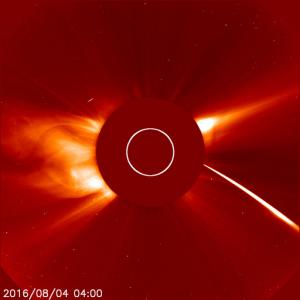
Summer Stargazing Nights
- Where:
- Frosty Drew Observatory
- When:
- Friday August 5, 2016 at 7:30 p.m.
- Cost:
- $1 Suggested Donation per Person
Tonight is Stargazing Night at Frosty Drew Observatory and it has certainly been a fabulous week of amazingly clear and starry nights! Tonight’s forecast is calling for mostly clear skies to start, becoming cloudy overnight. This will allow for us to catch stunning views of Saturn, Mars, and dozens of nebulae and star clusters before clouds set in. Add in that the 12% waxing crescent Moon hangs beautifully over the western horizon during twilight, setting at 9:30 p.m., and we have a night to celebrate! The annual Seafood Festival will be taking place this weekend in Ninigret Park (home to Frosty Drew) and will bring a big increase in visitors to the park as well as an increase in artificial light over the Observatory. Though we will still try for fabulous views of the cosmos.
We will open the Observatory, Sky Theatre, and Nature Center at 7:30 p.m. In the Observatory we’ll start with a super fast view of Jupiter, probably the last viewing of the summer, followed by stunning views of the crescent Moon and Saturn. Telescopes will be setup in the Observatory courtyard showcasing nebulae, star clusters, and binary stars along the visible Milky Way galactic plane. The Sky Theatre will feature celestial objects photographed at Frosty Drew Observatory with a commentary and open discussion on general astronomy. The Nature Center will stay open until 10:00 p.m. with Frosty Drew Naturalists available to enlighten you on the daytime side of Frosty Drew. The Observatory will stay open until clouds chase us out and we’ll post a “Closing up” message to our Twitter (@FrostyDrewOBSY) and Facebook when we decide to start packing it in.
Overall, tonight looks to be a great night for stargazing. We have a super sexy crescent Moon, the Milky Way blazing overhead, and dozens of Perseid meteors streaking by. The Seafood Festival will overpower some of the Milky Way, though we are expecting a good night. Note that you may encounter parking attendants for the Seafood Festival that may stop you en route to Frosty Drew. If so, kindly notify them that you are visiting Frosty Drew Observatory and they will let you pass. you DO NOT NEED TO PAY FOR PARKING at Frosty Drew Observatory. Also note, that Seafood Festival parking staff are unaware of Frosty Drew scheduling, so do not turn around and go home if told that the Observatory is closed. Now grab some friends, your family, or just your geeky self and head over to Frosty Drew for a night under the darkest skies in Rhode Island and become acquainted with that inner geek just waiting to break free.
-------------------------------------------------------------------------
Weekly Happenings
Scott MacNeill
As midnight approached this past Wednesday, August 3rd, a fabulous Kreutz sungrazer comet was completely destroyed as it passed into the solar corona. Overall, this is not all that uncommon and usually not worth a mention. Though in this case, Wednesday’s comet flared up extremely bright, to near magnitude -0.5, which is brighter than Arcturus – the brightest star in the Northern Hemisphere summer nighttime sky. Sungrazer comets are fragments from the breakup of a huge comet that was destroyed centuries ago. These fragments pass extremely close to the Sun during perihelion (closest approach to the Sun in yearly orbit) with many plummeting into the Sun’s corona. Additionally, many of the awesome comets throughout history were sungrazer comets. Check out this GIF and this GIFfrom the Solar and Heliospheric Observatory (SOHO) of the comet blazing into the solar corona at speeds near 1.3 million miles per hour.
The Perseid Meteor Shower, which started on July 17th, is really starting to kick in. This past week we have had many fabulous nights under super dark, clear skies allowing for stunning views of the increasing number of Perseid meteors streaking the overnight sky. The peak starts during the early morning on Friday, August 12th and will continue well into Saturday morning. The Perseid shower will usually blaze up to 100 meteors per hour radiating from the constellation Perseus. Though this year, Earth is passing through a dense region of comet debris, making for nearly twice that rate. Frosty Drew Observatory will be open all night Thursday, August 11th and Friday, August 12th for the shower peak. Step out on a clear night this week and sit under the sky for about an hour. You’re sure to see a few Perseid meteors. Read about the Perseid shower.
-Scott


